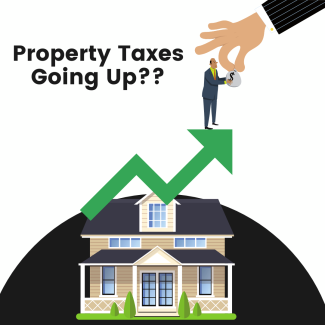
Property Taxes Going Up??
Ah, property taxes. One of life's certainties, like death and the fact that the line at the DMV will always be longer than you expect. But what happens when you think your property tax value is too high?
If you are wanting to appeal the value of your primary residence you should first ensure you have the homestead exemption applied to your property. This exemption reduces the value the taxing authorities used to calculate your total property tax bill. It is typical to have 3-4 taxing authorities that charge you property taxes. This is normally your city, the county, the local district and possibly a local college.
In Texas, the homestead exemption for the school district is a flat $40K. In other words if your property is worth $500K, the school district will charge you taxes as if your property was worth $460K. In addition, the other taxing authorities can give you a discount up to 20% of your home value with a minimum of $5K. This can amount to thousands of dollars depending on the value of your home so make sure you have this in place. You can find the form you need to fill out here. The deadline to submit the form to your taxing authority is April 30th for 2023 but you have up to 2 years to submit the form and still be accepted.
If you have the homestead and still disagree with the assessed value then the first thing you need to do is gather information. This means collecting data that shows that the value of your property is lower than what the state thinks it is. You can do this by researching the prices of similar properties in your area or by getting an appraisal from a licensed appraiser. The exhaustive list of items to consider is:
- Photographs of property (yours and comparables)
- Receipts or estimates for repairs
- Sales price documentation, such as listings, closing statements and other information
- Calculations of median level of appraisal, if equal and uniform appraisal is protested
- Affidavits, if needed
- Newspaper articles
- Architectural drawings or blueprints
- Engineering reports
- Property surveys
- Deed records
Now state law specifies that the tax value is based on the market value of the home. Market value is the price at which a property would transfer for cash or its equivalent under prevailing market conditions if:
- it is offered for sale in the open market with a reasonable time for the seller to find a purchaser;
- Both the seller and the purchaser know of all the uses and purposes to which the property is adapted and for which it is capable of being used and of the enforceable restrictions on its use; and
- Both the seller and purchaser seek to maximize their gains and neither is in a position to take advantage of the need or demand of the other.
In laymen’s terms if you put your house on the market and didn’t have to panic sell it, what could you get for it? So make sure you document all the things you hate about the house, except for the people in it 😁. But seriously document all of the repairs or improvements that are needed on the property. Be prepared to present your evidence in a clear, concise and non-emotional way. A little humor couldn’t hurt as well as you will be presenting to an individual or a group of 3 called the appraisal review board.
Once you've got all the information you need, it's time to take action. The best way to do this is by filing an appeal with your local tax assessor's office. This is usually done by filling out a form that you can find online or by visiting the assessor's office in person. The state offers a standard form here but the fastest way is to fill everything out online so you can upload it directly. You will generally need the “notice of appraised value” form to access your Efile pin that will be requested for your file.
The most common reason to appeal is based on you feeling the value of your property is too high but you can also appeal if the district denied your request for a special appraisal(generally used for open space land) or if you had an exemption denied.
You can also request an informal hearing with your appraisal district prior to your official protest to collect additional information. This can be requested over the phone to the office or included on your protest form. Ask one of the appraisers to explain how the district arrived at the value of your property. Be sure they have the correct description of your property with the proper measurements.
You can request the official protest with the ARB, to be in person, via phone, video or a mailed in appeal form with an affidavit. You also have the option to appoint an agent to present the case on your behalf. The request must be filed no later than May 15th or within 30 days of receiving the notice of appraised value. The hearings are generally held from May 15th through July 20.
During the appeal be sure to show up on time, stick to the facts, review the appeal procedures(you can find that here) and organize your information. You will only want to stick to relevant information that happened up until January 1 of the year in question.
You will receive a decision on your protest via certified mail. If you are still unsatisfied with the decision you can file an additional appeal to the state district court, the State Office of Adminstrative Hearings or to a binding arbitration. If you feel that the procedures manual wasn’t followed properly you can file a request for a limited binding arbitration(LBA) to compel the ARB to comply with the procedures you feel they mishandled.
If you've done your homework and presented your case well, there's a good chance that the district will see things your way. Good luck and happy saving!

